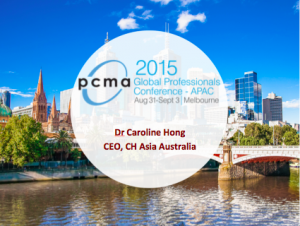 carolinehong@carolinehong.com.au
carolinehong@carolinehong.com.auBusiness Events in the Asia Pacific Region – Economics, Culture, Bringing it all together
If you are a professional conventions manager, business events planner, decision maker for business events in your company or association or a supplier of services to the business events industry, you play a very important role.
You bring direct and indirect value because business events play an important role, contributing to jobs and economic growth.


Photo: Melbourne, Australia – PCMA Global Professionals Conference – APAC 2015
Over the next few days in the first week of Spring, Melbourne, Australia will be welcoming leading event planners and conference managers as they come together for the 2015 Global Professionals Conference – APAC, hosted by the Professional Conventions Management Association (PCMA), which has its headquarters in Chicago, USA.
PCMA is a leading organization, for meeting and event professionals with more than 6,500 members and 50,000 customers. It exists to deliver superior and innovative education and promote the value of professional convention management. Read more: http://www.pcma.org
I am privilegd to be one of the invited speakers for the PCMA Global Professionals Conference – IAPAC, and working alongside Nigel Collin who will be facilitating the conference. I look forward to delivering the closing presentation, bringing together the relevance of economic and cultural considerations in organising a successful business event in the APAC region.
Business events are important and their success requires professionalism in convention management. Business events in the form of meetings, incentives, conventions and exhibitions contribute to economic growth and creation of jobs. Business events stimulate infrastructure investment, innovation and much more.
Business events is not just about floor space registrations, food and beverage and accommodation. The impact of business events extend beyond the event and tourism. Business events require professional management to achieve the desired outcomes and results. It is a business project which requires all the elements of running a business.
In Australia alone, business events contribute to billions of dollars and thousands of jobs. It is enough to make our government take notice.
Over 37 million people attended more than 412,000 business events across Australia in 2013-2014.
$28 billion in direct expenditure
$13.5 billion in direct value added
179,357 direct jobs
$23.1 billion total economic contribution (gdp)
How do business events do that?
Business events attract investment decision makers and global leaders to a destination, host city or country, which they might otherwise not consider visiting.
Business events promote and show case the destination to the event attendees.
If it is an international business event, the real value extends beyond tourism benefits.
The average business event visitor spends more money than the average tourism visitor.
There are many indirect and intangible benefits, some of which include:
Networking, Education, Trade, Research, Leverage, Funds, Prestige, Benefits to the leisure tourism sector and Regional dispersal and much more.
In May 2011 I was one of the volunteer contributors and particpants to the survey and research studies by UTS on the report “Beyond Tourism Benefits: Measuring the social legacy of business events” research which has assisted BESydney to build a stronger case for the numerous social, innovation and knowledge benefits of hosting conferences and conventions. I shared many lessons learnt about bidding, winning, launching, hosting and post event follow up, for a 2009 World Federation for Ultrasound in Medicine (WFUMB) Congress. It was a most ambitious and challenging project that I had taken on and worked on over a nine year period.
For more information contact: carolinehong@carolinehong.com.au
For valuable insights for a successful business event or about the business events industry from an experienced adviser, consultant and business events decision maker and planner, email carolinehong@carolinehong.com.au
